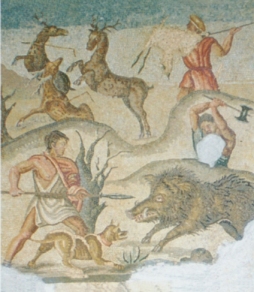 Chiusi's origin dates back to the first millennium before Christ. In the 6th century B.C. CLEVSIN or CAMARS (Chiusi's Etruscan names) was one of the 12 most important cities in the Etruscan federation, and under King Porsenna Chiusi reached its peak when the Etruscans fought and defeated the Romans. In the National Archaeological Museum it is possible to admire the greatness of this Etruscan city through the archaeological findings that express the exquisite sensibility of its artists and the mastery of its craftsmen.
Chiusi's origin dates back to the first millennium before Christ. In the 6th century B.C. CLEVSIN or CAMARS (Chiusi's Etruscan names) was one of the 12 most important cities in the Etruscan federation, and under King Porsenna Chiusi reached its peak when the Etruscans fought and defeated the Romans. In the National Archaeological Museum it is possible to admire the greatness of this Etruscan city through the archaeological findings that express the exquisite sensibility of its artists and the mastery of its craftsmen.
Â
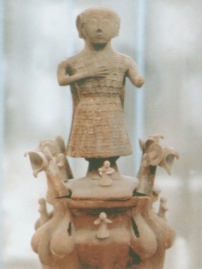 In 391 B.C., Chiusi was besieged by the Gauls which marked the beginning of its decline and later became a Roman province. The city, rebaptized Clusium, and its territory continued to have an important role and in 89 B.C. its inhabitants were granted the Roman citizenship. In the 6th century A.D. Chiusi was occupied by the Lombards and became a dukedom. Later, Emperor Charlemagne trasformed Chiusi into a county. Chiusi became a battlefield between Florence and Siena, being a faithful ally of the latter, the city declined and only in the 19th century with the complete reclamation of the valley below did it start reliving.
In 391 B.C., Chiusi was besieged by the Gauls which marked the beginning of its decline and later became a Roman province. The city, rebaptized Clusium, and its territory continued to have an important role and in 89 B.C. its inhabitants were granted the Roman citizenship. In the 6th century A.D. Chiusi was occupied by the Lombards and became a dukedom. Later, Emperor Charlemagne trasformed Chiusi into a county. Chiusi became a battlefield between Florence and Siena, being a faithful ally of the latter, the city declined and only in the 19th century with the complete reclamation of the valley below did it start reliving.
Â
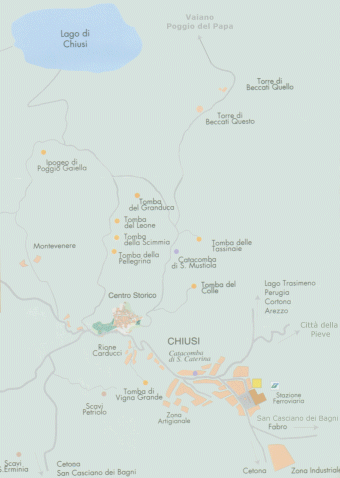
Â
A tour at Chiusi offers the possibility of very interesting and often emotional encounters with past civilizations such as: the Etruscan era in the National Archaeological Museum and the many tombs located in the area, followed by the Roman era and later by the Medieval era. In particular wc recommend the catacombs of St. Mustiola and St. Caterina, the Etruscan-Roman walls, the Early Christian Cathedral of St. Secondiano. the church of St. Francesco and the medieval area. Noteworthy, are the Cathedral, Museum that conserves many treasures including the famous Olivetan anthem books (XV sec. A.C.) and the Bishop's Garden with its important archaeological excavations, from which one can enter into the stimulating tunnels of Porsenna's labyrinth that crosses the entire square and lead to a big Roman cistern (1st cen. B.C.). From the cistern it is possible to go up into the Cathedra) Bell Tower (built in the 12th cen. as a defense tower) that dominates not only the city but all the surrounding where Chiusi's lake stands out, rich in ancient legends and for its suggestive panorama. The lake also offers the possibility to spend pleasant moments relaxing or doing sport activities such as rowing, fishing and swimming. In the restaurants along its shores the tourist has the opportunity to taste the many delicious ways fresh lake fish is preparated.
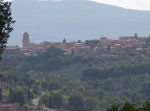 Chiusi | Â | 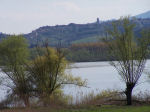 Chiusi's lake |
Â
Nearby the towers "Beccati Questo and Beccati Quello" the mark the boundary between Umbria and Tuscany.
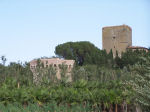 The towers "Beccati Questo and Beccati Quello" |
Â
National Archaeological Museum
- Opening hours: Tues-Thurs 9am-2pm, Sat & Sun 9am-1pm.
- For guided visits: ask one of the museum guards to visit the etruscan tombs (Monkey, Pilgrim and Lion)
- For information. Phone nr. 0578-20177

